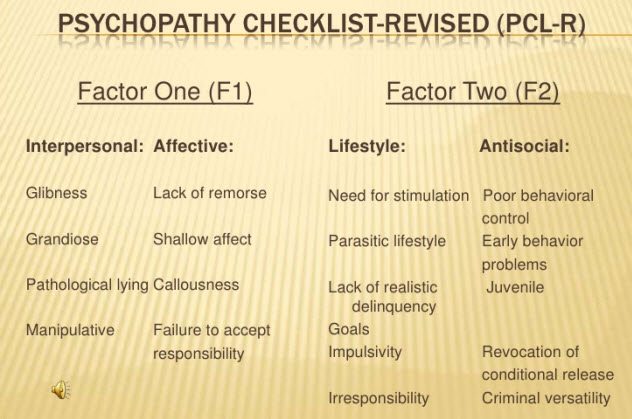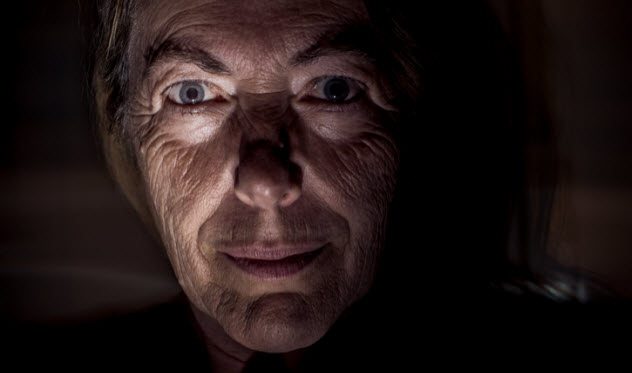 History
History  History
History  Weird Stuff
Weird Stuff 10 Wacky Conspiracy Theories You Will Need to Sit Down For
 Movies and TV
Movies and TV 10 Weird Ways That TV Shows Were Censored
 Our World
Our World 10 Places with Geological Features That Shouldn’t Exist
 Crime
Crime 10 Dark Details of the “Bodies in the Barrels” Murders
 Animals
Animals The Animal Kingdom’s 10 Greatest Dance Moves
 Movies and TV
Movies and TV 10 Box Office Bombs That We Should Have Predicted in 2025
 History
History 10 Extreme Laws That Tried to Engineer Society
 History
History 10 “Modern” Problems with Surprising Historical Analogs
 Health
Health 10 Everyday Activities That Secretly Alter Consciousness
 History
History 10 Dirty Government Secrets Revealed by Declassified Files
 Weird Stuff
Weird Stuff 10 Wacky Conspiracy Theories You Will Need to Sit Down For
 Movies and TV
Movies and TV 10 Weird Ways That TV Shows Were Censored
Who's Behind Listverse?

Jamie Frater
Head Editor
Jamie founded Listverse due to an insatiable desire to share fascinating, obscure, and bizarre facts. He has been a guest speaker on numerous national radio and television stations and is a five time published author.
More About Us Our World
Our World 10 Places with Geological Features That Shouldn’t Exist
 Crime
Crime 10 Dark Details of the “Bodies in the Barrels” Murders
 Animals
Animals The Animal Kingdom’s 10 Greatest Dance Moves
 Movies and TV
Movies and TV 10 Box Office Bombs That We Should Have Predicted in 2025
 History
History 10 Extreme Laws That Tried to Engineer Society
 History
History 10 “Modern” Problems with Surprising Historical Analogs
 Health
Health 10 Everyday Activities That Secretly Alter Consciousness
10 Ways Pop Culture Has Skewed Our Perceptions About Psychopaths
Over the years, psychopathy has been depicted extensively in popular culture. Whether these people are in movies, books, or television programs, we’re never too far from encountering a psychopath in a fictional sense or otherwise.
As they’re portrayed, they’re not going to be the people you invite for dinner. The media paints psychopaths as cold, calculating individuals who can’t tell right from wrong. They are just downright evil in many people’s eyes.
Sure, they’re not wired like the average person. But they’re not all sinister characters like Hannibal Lecter in The Silence of the Lambs, either. Today, we’ll tell you the truth about psychopaths. It may not be what you expect.
10 Lack Of Empathy

Cold, alien people who live outside the norms of society. That’s the general perception of psychopaths we’ve gained from popular culture. Certainly, most of us wouldn’t describe a psychopath as an empathic individual.
When Hannibal Lecter was callously butchering and eating people, he obviously had no thoughts about the person’s pain. But simply saying that psychopaths are not empathetic isn’t exactly true.
It’s more that they have an empathy switch. This metaphorical switch in their heads can be turned on or off or dimmed down at a time of their choosing. The switch can also be influenced by external factors.
For the majority of people, feeling empathy is natural. It’s not something you need to think about. But for psychopaths, empathy is not the default mode. It’s more a voluntary feeling.
When they want to empathize, they can turn on the charm and do just that. This is often for their own personal gain. Once they’ve used their methods of seduction, the empathetic switch is turned off.[1]
Psychopaths are aware of what empathy is. But for them, it’s a real effort to be empathic. The feeling of empathy is like being held in restraints. Once the shackles are loose, that’s when you get the psychopaths that you’ve learned about in popular culture.
9 Psychopaths Are All Manic Men

There’s a reason that the vast majority of psychopaths in popular culture are men. It’s simply because this mental health disorder primarily manifests in men. We’re very rarely confronted with a female psychopath.
In part, this is because women naturally possess greater levels of empathy than men. Women are generally more concerned about moral issues and other people’s well-being than men. Therefore, psychopathic females are likely to rate a lot lower on the PCL-R (psychopathy checklist) than their male counterparts.[2]
Although few studies have been done on women, research into male psychopathy has been carried out extensively, especially on prison populations. Psychopaths in such institutions tend to be men.
It’s also widely believed that psychopathy in women manifests later in life. It may develop due to jealousy, manipulation, unstable relationships—things that tend to happen in adult life. It’s a form of relational aggression, as opposed to covert aggression which is commonly displayed by male psychopaths.
8 Nothing Can Alter A Psychopath’s Way Of Thinking

Think about the psychopaths you’ve known from popular culture. Do you think that having a sit-down with them and telling them to be more empathic would have an effect?
No, they’d probably just scoff and dismiss everything you say. Even if they were to take some of it in, it would be unlikely to have much effect. In fact, it seems preposterous to think it would work.
But there’s a study that shows that it actually can work. Whether psychopaths consciously or unconsciously make a decision to feel empathy, telling them to be more empathetic can actually make them more empathic.
A Dutch team of scientists showed a group of 21 psychopaths some videos of violent crimes, people in pain, and people in conflict with one another. The brain activity of the group was measured. The motor, somatosensory, and emotional brain regions of the patients weren’t as active as nonpsychopathic patients.
Then the study participants were told to try to empathize more with the individuals in the videos. The activation of these brain regions increased to the point where it was hard to distinguish between the brain images of the psychopathic and nonpsychopathic patients.[3]
Instead of keeping Hannibal Lecter caged up, perhaps just telling him to be more empathetic would have been the best course of action.
7 A Case For Insanity

The psychopathic maniacs offered up by popular culture are often killers who are capable of truly heinous crimes. In horror movies and psychological thrillers, these characters and their twisted ways are often rammed down our throats. Consequently, they stick in our minds and change our perceptions of psychopaths in real life.
Of course, some people do fit this characterization. Most people would deem such individuals to be insane. But the majority of psychopaths are anything but. They are not psychotic. Instead, they are very much in control of their mental faculties. They know what’s right and what’s wrong. It’s just that they’re not emotionally involved, so they find it easier to make wrong decisions and commit crimes.
The American Psychiatric Association recognizes psychopathy as a personality disorder rather than an insanity disorder. Nevertheless, philosophers and neuroscientists have argued for insanity pleas to be allowed.[4] Even so, psychopaths aren’t legally classified as being insane. However, it may be hard to believe that the psychopaths we know from popular culture are not insane.
6 Psychopathic Traits Mean Psychopath

The use of the term “psychopath” gets thrown around far too loosely nowadays. Anyone who does something remotely bad must be a psychopath. We’re not just talking about killers, either.
Famous characters from popular culture—such as Dr. House from the eponymous series or Dr. Cox from the medical comedy, Scrubs—have been labeled psychopaths by quite a few people. Their poor bedside manners, grandiose attitudes, cockiness, and other traits led people to believe that they had this personality disorder.
They definitely had a few traits that would appear on the PCL-R checklist. But that certainly is not an indication of psychopathy. Most of us will have a few ticks on that PCL-R checklist. It’s not a reason for alarm.
The Society for the Scientific Study of Psychopathy has deemed an indication of psychopathy to be a “constellation of traits.”[5] Therefore, pay no heed to this trend of labeling everybody and anybody a psychopath. Not every bad person on this planet is a psychopath.
5 Criminals Are Psychopaths

In popular culture, every Tom, Dick, and Harry who winds up in prison tends to be a psychopath. It has led us to believe that prisons are full of psychopathic individuals.
It’s true that the vast majority of people in prison do have a personality disorder of some type. This is based on violent, antisocial actions. But these traits don’t extend to psychopathy.
Approximately 75 percent of prison inmates have personality disorders. Only 16 percent of US inmates are psychopaths. Therefore, it’s important to note that criminality and psychopathy don’t necessarily go hand in hand.[6]
4 They Possess No Emotion

They are cold, calculating individuals with absolutely no emotion. That’s the only reason that these psychopathic people from popular culture can commit their crimes. It’s not just a case of lacking empathy. The entire range of emotions is lacking. Even positive emotions like love.
When Hannibal Lecter developed psychopathy, he found it hard to love anyone. He just wanted to play with people’s minds because they fascinated him for his own amusement. Of course, he wanted to feast on their organs, too.
But this doesn’t mean that psychopaths don’t have any emotions. That’s a different type of personality disorder entirely. Classic psychopaths, those at the high end of the spectrum, have a hard time feeling emotions. However, there are incidences that can trigger an emotional response.
For example, the death of someone with whom there’s a close bond can elicit crying. A psychopath’s ability to experience emotions really depends on how high his individual score is on the PCL-R checklist.[7]
3 Always Content

Psychopaths in popular culture never seem to feel down. Even after committing heinous acts, they’re rarely depicted as crying or in emotional turmoil because of their actions. They give the impression that they’re in control and content with where they are and what they’ve done. Even when chained up in prison cells, they seem almost happy with life.
But in reality, psychopaths can feel down even though they don’t experience the same level of emotions as the average person. They can even experience depression. That’s because psychopaths have a strong sense of entitlement. When things aren’t going their way, that’s when they commit crimes.
But sometimes, things can’t be put right by committing offenses. Psychopaths can’t always get their own way. This can be very distressing and can lead to other mental health disorders such as depression. A depressed psychopath sounds a tad odd, but it is fairly common among certain types of psychopaths.[8]
2 Don’t Pay Heed To Other People’s Emotions

Psychopaths from popular culture can only commit their crimes because they don’t have a clue about emotions. In the real world, that’s simply not the case. They may not be in touch with their own emotions, but they’re probably more adept than most people at reading others.
Let’s look at Hannibal Lecter again. He could read people like a book. Sure, he was a psychiatrist, but psychopaths in other professions can be just as skilled. They know and understand what you feel. They just don’t care. That’s why they can often be very charming—because they know what makes you tick. That characteristic makes them very dangerous, cunning individuals.[9]
1 We All Know What The Term ‘Psychopath’ Means

The word “psychopath” gets thrown around a lot in popular culture. Therefore, you’d think that medical professionals would have a good understanding of psychopathy. However, the label “psychopath” is actually ill-defined.
When it comes to the Diagnostic and Statistical Manual of Mental Disorders, psychopathy isn’t to be found. The closest condition is an antisocial behavioral disorder.
Despite these prominent figures from popular culture who are labeled as psychopaths, it’s not an actual diagnosis. A more accurate diagnosis would be an antisocial personality disorder.[10] Yes, even for Hannibal Lecter.
My published book can be found here on Amazon. You can also visit my Twitter account where I publish all my work as well as my profile pages on TheRichest and TheSportster.
Read more about psychopaths and find out if you or your friends fit the criteria on 10 Signs You May Be A Psychopath and 10 Unexpected Benefits To Being A Psychopath.








